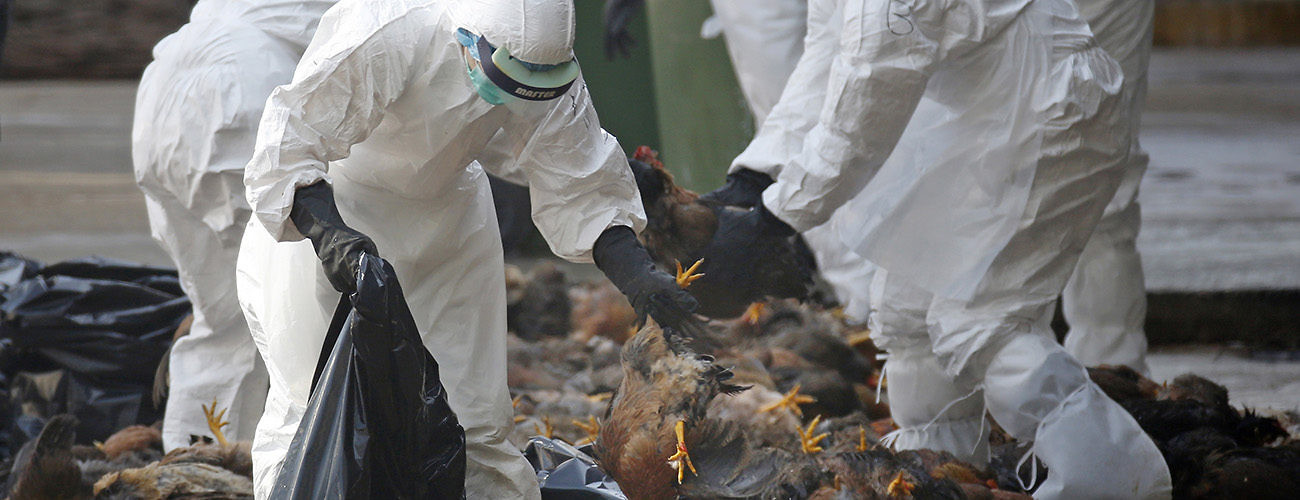Health workers in China collect dead chickens at a poultry market found to have cases of bird flu. December, 31, 2014 (Kin Cheung, Associated Press)
The rise of superbugs, the yellow fever outbreak in Brazil, and the spread of H7N9 avian influenza in China are among the global health threats facing the next leader of the World Health Organization (WHO). The eighth WHO director-general, to be elected in May by the World Health Assembly for a five-year term, has the potential to shape the long-term future of global health security by guiding WHO’s response to these and other infectious disease outbreaks.
There are three candidates to replace outgoing director-general Margaret Chan, who has served in the role since 2007: David Nabarro of the United Kingdom, Sania Nishtar of Pakistan, and Tedros Adhanom Ghebreyesus of Ethiopia. Whoever prevails will need to demonstrate WHO’s leadership and relevance in the field of pandemic response, to restore public confidence in the institution following its mishandling of the Ebola crisis in West Africa in 2014-16. Outspoken support for this issue has become a sine qua non within the organization since the outbreak, especially for WHO’s top three donors, the United States and UK governments and the Gates Foundation, which supply it with hundreds of millions of dollars each year for communicable disease control.
The new WHO chief will be expected to oversee a diverse array of initiatives and reforms. These include strengthening WHO’s emergency response capacity, supporting national emergency preparedness plans, and improving standards for inter-agency cooperation during a crisis. This is despite an $87 million budget shortfall for core emergency programs in 2016-17 and the possibility of a one-third or more reduction in global health spending by the US under the Trump administration next year. In 2015, Chan’s request for a 5% increase in annual dues—which have hardly changed since the early 1990s—was rebuffed by WHO member states.
Many experts agree that as a first step to winning back stakeholder confidence, the new director-general will need to exhibit greater political leadership. In a recent editorial, Wellcome Trust Director of Policy Ed Whiting said this would go a long way to restoring trust in the institution, and supported naming and shaming countries that fail to take action to combat global health risks. WHO’s own assessment panel has stressed the need for “independent and courageous decision-making” from the very top.
However, candidates will need to walk a fine line between exerting their autonomy and remaining accountable to influential officials and donors within the WHO executive board and the 194-country World Health Assembly.
There have also been calls to elect an outsider in a year in which the status quo has been upended in major political contests worldwide. The unexpected exit from the race in January of WHO Assistant Director-General Flavia Bustreo of Italy suggests the executive board may be looking elsewhere for leadership. It is hoped that such an individual can mobilize funds and leverage relationships with WHO’s growing list of partners, including pharmaceutical companies and others in the private sector.
All three remaining contenders possess wide-ranging experience, and all articulated support for global health security while campaigning at a public debate in Geneva this month. However, their professional backgrounds indicate possible divergent approaches to tackling this issue.
Nabarro holds arguably the most extensive background in emergency preparedness, having served as United Nations special envoy on Ebola and UN system coordinator for influenza. While some may view his relative insider status as a liability, his familiarity with navigating the complex UN and WHO bureaucracies (the WHO is an agency of the UN) and coordinating inter-agency action could help him to exercise competent leadership during a crisis.
Nishtar’s credentials include serving as national health minister and a civil society leader in Pakistan, where she worked to strengthen health service delivery and governance. Her grassroots approach will likely appeal to development professionals and others engaged in long-term strengthening of health systems and community-based disease surveillance in at-risk settings.
Tedros has devoted much of his career to disease prevention, treatment, and eradication campaigns, including high-level postings at the Global Fund to Fight AIDS, Tuberculosis, and Malaria and the Global Alliance for Vaccines and Immunization. He has also acquired a reputation as a charismatic and savvy political figure, having served as both Ethiopia’s foreign minister and health minister (incidentally, he is the only nominee who is not a physician).
That the candidates have taken different tacks to address what are fundamentally interrelated challenges underscores broader questions about the appropriate roles and priorities of WHO in strengthening global health security. For example, to what extent should the organization engage in crisis response operations versus long-term disease-eradication programs?
According to a 2015 Harvard-London School report, WHO has overreached in recent years by expanding the scope of its activities and thematic areas (programs on the health effects of climate change, social determinants of health, etc.). This has occurred even as dwindling resources have led to cuts to core programs, which precipitated the Ebola crisis. The next director-general will need to mediate between these competing priorities to advance a new health security agenda, especially given the prospect of major budget cuts by the US government.
For all this, the election appears less likely to hinge on philosophical differences than on politics and regional dynamics. Potential support for Tedros from the 55-country African Union and his strong political ties (which reportedly include close relations with the Clinton and Gates Foundations going back to his tenure as Ethiopia’s health minister) make him a formidable contender. Also in a strong position is Nabarro, as the sole European candidate—following the removal from the race of well-qualified French, Hungarian, and Italian nominees in January—assuming there is no “Brexit” backlash from other governments on the continent.
Whoever prevails, he or she will be judged primarily on whether they can achieve the reforms needed to bring WHO up to speed with 21st century health threats.





